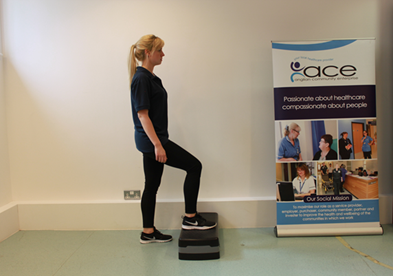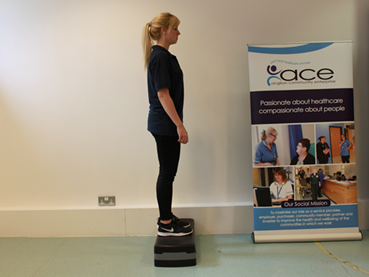Self help resources - Knee

Useful Sites
The following information has been written to help you fully self-manage your knee pain.
However, please self-refer straight away to be assessed by a Physiotherapist if you:
- Have had recent trauma to your knee and have a significant loss of movement/strength or noticeable swelling
- Constant day & night knee pain that you cannot settle
- You are off-sick and struggling to return to work due to your knee pain
- Your symptoms are worsening and are not improving despite following the advice below over the course of six weeks
If you have a history of cancer, immunodeficiency or TB and have new, unexplained and constant pain then please speak to your GP whilst you attempt the following self-help advice.
What can I do to help?
Knee pain is common and can be due to many different factors. Whatever the cause, it is important to exercise and keep as active as possible. Knee can also be self-managed really effectively following some simple advice and exercises. If you are struggling with your pain, the following initial advice should help you to get started:
Pain relief: Basic painkillers (like paracetamol) or non-steroidal anti-inflammatory gels (such as Ibuleve/Voltarol) are easily available over the counter without the need for prescription. These can be very effective as they lessen your discomfort and importantly allow you to keep moving/active. However, please check the labels for instructions/safe usage and any possible reasons why you should not use them. If you are currently taking any form of medication it is advisable to consult your GP or Pharmacist before taking additional pain relief.
Ice: If you have persistent knee pain/ache then applying an ice pack may be helpful for reducing pain/irritation. A packet of frozen peas wrapped in a tea-towel works well. Leave in place for up to 15 minutes at a time. This can be repeated several times a day if found helpful.
Rest vs. activity: It is usually best to carry out your normal activities, but try not to overdo it. Let pain be your guide; short-lasting/temporary discomfort is fine but worsening or constant 24/7 pain indicates you are likely doing too much and need to take things a little easier. You need to pace yourself to start with and try to do a bit more each few days. You will find keeping your knee gently moving more comfortable than complete rest.
Exercise
Exercise can be an extremely beneficial treatment for your knee pain as it can gradually build the tolerance and load-capacity of your tissues and help ease stiffness and soreness. Knees can respond really well to gradual strengthening over a course of a few months plus losing that extra bit of excess body weight where possible.
Please try this exercise programme 1-2 times a day. A small increase in pain is OK if it goes away within 30 minutes and not worse the next day. If you feel like you have done too much, do not worry, do fewer repetitions the next time and then gradually build up again. It may take 5-6 weeks before you start to see improvement.
For a printable version of these exercises please click here
If your knee does not start to improve over the next 6 weeks, or gets worse despite the exercises, then you can self-refer yourself to see a Physiotherapist for an assessment.
Exercise 1 - Straight leg raise lying
Lying or long-sitting
Lift your affected leg up straight around a foot off the bed. Hold for 5 seconds then lower slowly
Perform 5-10 repetitions aiming for slight ache/fatigue
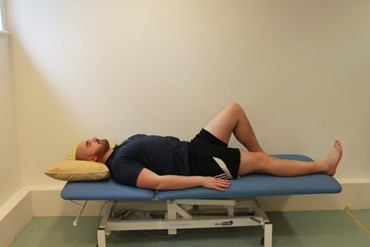
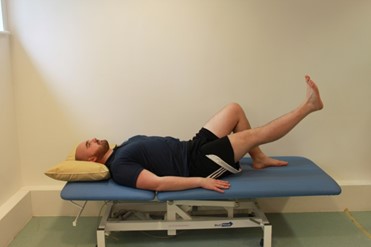
Exercise 2 – Knee Extension in sitting
Sit in a chair or on the edge of your bed
Hold your affected leg out straight for a count of 5 seconds then lower slowly
Perform 5-10 repetitions aiming for slight ache/fatigue
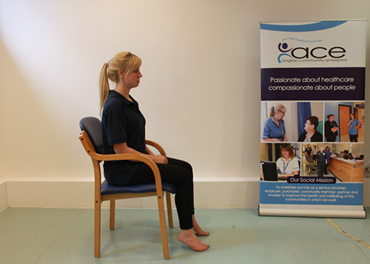
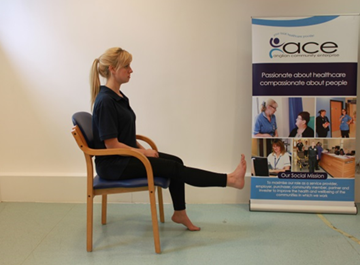
Exercise 3 - Sit to stand
Repeatedly sit to stand from a sturdy chair. Try not to use your arms if possible. The lower the chair, the harder it is to perform.
Perform 5-10 repetitions aiming for slight ache/fatigue
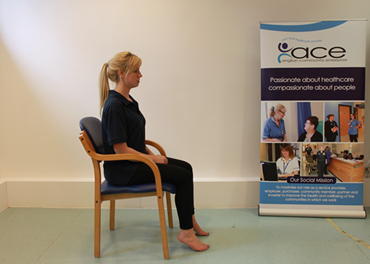
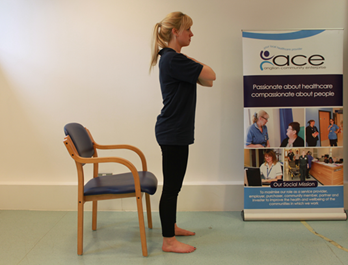
Exercises 4 - Step ups
Repeated step up on a single step or the lowest step at the bottom of a flight of stairs. Use the bannister if needed for balance.
Perform 5-10 repetitions aiming for slight ache/fatigue
